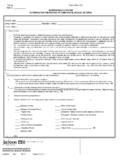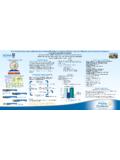Transcription of Table of Contents - Jackson Health System
1 Jackson Health System revenue cycle Policy No. RCM100 Section: Corporate Business Office Subject: revenue cycle Accounts Receivable Management Overview Created: 09/22/2017 Supersedes: NEW Page 1 of 6 Table of Contents I. Purpose .. 1 II. Definitions .. 1 III. Procedure .. 2 A. General Principle .. 2 B. For Inpatients .. 4 C. For Outpatients .. 5 D. Policy Availability .. 6 IV. References .. 6 I. Purpose This policy applies to Jackson Health System and its employed medical partners (collectively JHS ). This policy, together with Financial Assistance Policy, is intended to meet the requirements of applicable federal, state, and local laws, including, without limitation, section 501(r) of the Internal revenue Code of 1986, as amended, and the regulations thereunder. This policy establishes the actions that may be taken in the event of nonpayment for medical care provided by JHS, including but not limited to extraordinary collection actions.
2 The guiding principles behind this policy are to treat all patients and Responsible Individual(s)'s equally with dignity and respect, to ensure appropriate billing and collection procedures are uniformly followed, and to ensure that reasonable efforts are made to determine whether the Responsible Individual(s) for payment of all or a portion of a patient account is eligible for assistance under the Financial Assistance Policy. II. Definitions Emergent Services: Emergent Services include medically necessary services provided after the onset of a medical condition, whether physical or mental, manifesting itself by symptoms of sufficient severity including severe pain, that the absence of prompt medical attention could reasonably be expected by a prudent layperson who possesses an average knowledge of Health and medicine to result in placing the Health of the person or another person in serious jeopardy, serious impairment to body function or serious dysfunction of any body organ or part or, with respect to a pregnant woman, as further defined in section 1867(e) (1) (B) of the Social Security Act, 42 1295dd(e)(1)(B).
3 A medical screening examination and treatment for emergency medical conditions or any other such service rendered to the extent required pursuant to EMTALA (42 USC 1395(dd)) qualifies as Emergent Services. Emergent Services also include: Services determined to be an emergency by a licensed medical professional; Inpatient medical care which is associated with the outpatient emergency care; and, Inpatient transfers from another acute care hospital to a JHS hospital for the provision of inpatient care that is not otherwise available. Extraordinary Collection Action (ECA): Any legal or judicial action to obtain payment against a Responsible Individual(s) for a bill related to a Self-Pay Account, or the reporting of adverse information about a Responsible Individual(s) to a consumer credit reporting agencies/credit bureaus. ECAs do not Jackson Health System revenue cycle Policy No.
4 RCM100 Section: Corporate Business Office Subject: revenue cycle Accounts Receivable Management Overview Created: 09/22/2017 Supersedes: NEW Page 2 of 6 include transferring of a Self-Pay Account to another party for purposes of collection without the use of any ECAs. FAP-Eligible Individual(s): A Responsible Individual(s) eligible for financial assistance under the FAP without regard to whether the Individual(s) has applied for assistance. Financial Assistance Policy (FAP): JHS Financial Assistance Program for Uninsured Patients Policy, which includes eligibility criteria, the basis for calculating charges, the method for applying the policy, and the measures to publicize the policy, and sets forth the financial assistance program. Non-Emergent, Non-Urgent services can generally be sub-classified as either: Elective Services : Medically necessary services that do not meet the definition of Emergent or Urgent above.
5 The patient typically, but not exclusively, schedules these services in advance. Other Services : Services where medical necessity has not been demonstrated to the reviewing clinician. Post Acute Care : Medically necessary services provided at a Hospital that is classified as post-acute care including rehabilitation services. Behavioral Health Services : Medically necessary services provided in a number of settings focused on the patient s psychological and mental Health . Plain Language Summary: A written statement that notifies an Individual(s) that JHS offers financial assistance under the Financial Assistance Policy (FAP) for inpatient and outpatient hospital services and contains the information required to be included in such statement under the FAP. Responsible Individual(s): The patient and any other individual(s) having financial responsibility for a Self-Pay Account.
6 There may be more than one Responsible Individual(s). Self-Pay Account: The portion of a patient account that is the responsibility of the patient or other Responsible Individual(s), net of the application of payments made by any available healthcare insurance or other third-party payer (including co-payments, co-insurance and deductibles), and net of any reduction or write off made with respect to such patient account after application of an Assistance Program, as applicable. Urgent Services include: Urgent Services include medically necessary services provided after sudden onset of a medical condition, whether physical or mental, manifesting itself by acute symptoms of sufficient severity (including severe pain) that a prudent layperson would believe that the absence of medical attention within 24 hours could reasonably expect to result in: placing the patient s Health in jeopardy, impairment to bodily function, or dysfunction of any bodily organ or part.
7 Urgent services are provided for conditions that are not life threatening and do not pose a high risk of serious damage to an individual s Health . III. Procedure A. General Principle 1. Jackson Health System is a public government owned, not-for-profit, charitable organization, which strives to improve the well-being of those it serves through an integrated Health care delivery System . With attention to fiscal responsibility, quality services are made available and accessible to those who need them. Jackson Health System revenue cycle Policy No. RCM100 Section: Corporate Business Office Subject: revenue cycle Accounts Receivable Management Overview Created: 09/22/2017 Supersedes: NEW Page 3 of 6 2. To assure that Jackson Health System maintains a responsible fiscal position at all times, Jackson Health System must make every effort to obtain payment from third-parties and those who can afford to pay.
8 Jackson Health System assumes the role for educating patients and responsible parties regarding admitting, billing, and collecting policies. In accordance with our mission statement, the following policies will serve as guidelines in determining admission status, in non-emergency situations, and for collection of accounts receivable. 3. All patients presenting for unscheduled treatment will be evaluated according to the following classifications: Emergent/Urgent, Non-Emergent/Non-Urgent. 4. Jackson Health System will provide Emergent and Urgent services without regard to the patient's identification, insurance coverage, or ability to pay. 5. Urgent or Emergent hospital services shall not be denied or delayed based on the Hospital s ability to identify a patient, their insurance coverage or ability to pay. However, Non-emergent or Non-urgent Health care services may be delayed or deferred based on the consultation with the hospital s clinical staff in those cases when the hospital is unable to determine a payment source for its services.
9 Services that are determined to be non-medically necessary may be deferred indefinitely until suitable payment arrangements can be made. These include, but are not limited to: cosmetic surgery; social, educational, and vocational services; telehealth and clinic visit services; treatment related to sex reassignment surgery, and pre-surgery hormone therapy. 6. The urgency of treatment associated with each patient s presenting clinical symptoms will be determined by a medical professional as determined by local standards of practice, national and state clinical standards of care, and the hospital medical staff policies and procedures. Further, all hospitals follow the federal Emergency Medical Treatment and Labor Act (EMTALA) requirements by conducting a medical screening examination to determine whether an emergency medical condition exists. It is important to note that classification of patients medical condition is for clinical management purposes only, and such classifications are intended for addressing the order in which physicians should see patients based on their presenting clinical symptoms.
10 These classifications do not reflect medical evaluation of the patient's medical condition reflected in final diagnosis. a. Subject to compliance with the provisions of this policy, JHS may take any and all legal actions, including ECAs, to obtain payment for medical services provided. b. All patients who do not have a life threatening condition must be formally registered or admitted prior to receiving treatment. Patients or those responsible for payment (guarantor) with acceptable third party benefits shall assign those benefits to Jackson Health System at time of registration. c. The obligation for payment for hospital services becomes effective at the time service is rendered. JHS will not engage in ECAs, either directly or by any debt collection agency or other party to which the hospital has referred the patient s debt, before reasonable efforts are made to determine whether a Responsible Individual(s) is eligible for assistance under the FAP.







